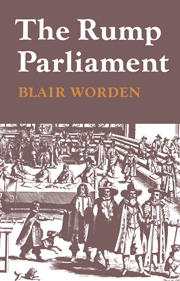Book contents
- Frontmatter
- Contents
- Dedication
- Acknowledgements
- Author's Note
- List of abbreviations
- Introduction
- PART ONE THE RUMP AND THE RUMPERS
- PART TWO THE RUMP AND REFORM
- PART THREE THE STRUGGLE FOR SURVIVAL, FEBRUARY 1649–SEPTEMBER 1651
- PART FOUR PARLIAMENT versus THE ARMY, SEPTEMBER 1651–APRIL 1653
- PART FIVE THE DISSOLUTION OF THE RUMP
- 16 The army apologias
- 17 Conclusion
- APPENDICES
- Bibliographical Guide
- Index
16 - The army apologias
Published online by Cambridge University Press: 29 January 2010
- Frontmatter
- Contents
- Dedication
- Acknowledgements
- Author's Note
- List of abbreviations
- Introduction
- PART ONE THE RUMP AND THE RUMPERS
- PART TWO THE RUMP AND REFORM
- PART THREE THE STRUGGLE FOR SURVIVAL, FEBRUARY 1649–SEPTEMBER 1651
- PART FOUR PARLIAMENT versus THE ARMY, SEPTEMBER 1651–APRIL 1653
- PART FIVE THE DISSOLUTION OF THE RUMP
- 16 The army apologias
- 17 Conclusion
- APPENDICES
- Bibliographical Guide
- Index
Summary
Why did Cromwell dissolve the Rump? At least part of the explanation clearly must lie in the provisions of the bill which, had he not intervened, would have passed the House on the morning of 20 April 1653. But what were those provisions? The bill has apparently not survived, so that we can never be wholly sure. Historians, nevertheless, have had few doubts. The bill for a new representative, they have decided, provided for the ‘recruitment’ of the Rump's membership. The existing members were to continue to sit, while the seats which had been vacant since Pride's Purge were to be filled by recruiter elections held under the Rump's auspices and presumably modelled on the precedent of the 1640s. The ‘new representative’ would thus have been no more than a fortified version of the old one. Here I shall contest this view. First, I shall suggest that the charge that the bill was a recruiting one is inaccurate; that, on the contrary, the bill provided for completely fresh elections; and that it follows from this that the generally accepted view of the Rump as a regime selfishly determined to perpetuate its power must be abandoned. Secondly, I shall argue that even if the recruitment charge were accurate, it would not provide the correct explanation of Cromwell's actions of 20 April. Cromwell's objection at the time of the dissolution to the bill for a new representative, I shall contend, was not that it provided for recruiter elections.
- Type
- Chapter
- Information
- The Rump Parliament 1648–53 , pp. 345 - 363Publisher: Cambridge University PressPrint publication year: 1974



